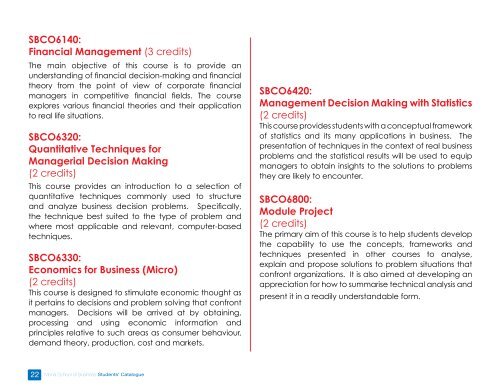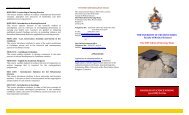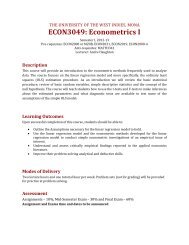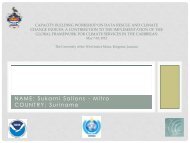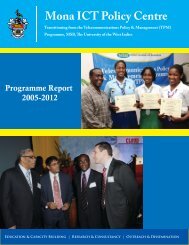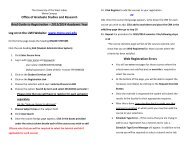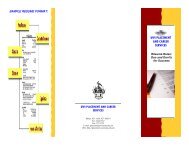Mona School of Business⦠- Uwi.edu
Mona School of Business⦠- Uwi.edu
Mona School of Business⦠- Uwi.edu
You also want an ePaper? Increase the reach of your titles
YUMPU automatically turns print PDFs into web optimized ePapers that Google loves.
SBCO6140:Financial Management (3 credits)The main objective <strong>of</strong> this course is to provide anunderstanding <strong>of</strong> financial decision-making and financialtheory from the point <strong>of</strong> view <strong>of</strong> corporate financialmanagers in competitive financial fields. The courseexplores various financial theories and their applicationto real life situations.SBCO6320:Quantitative Techniques forManagerial Decision Making(2 credits)This course provides an introduction to a selection <strong>of</strong>quantitative techniques commonly used to structureand analyze business decision problems. Specifically,the technique best suited to the type <strong>of</strong> problem andwhere most applicable and relevant, computer-basedtechniques.SBCO6330:Economics for Business (Micro)(2 credits)This course is designed to stimulate economic thought asit pertains to decisions and problem solving that confrontmanagers. Decisions will be arrived at by obtaining,processing and using economic information andprinciples relative to such areas as consumer behaviour,demand theory, production, cost and markets.SBCO6420:Management Decision Making with Statistics(2 credits)This course provides students with a conceptual framework<strong>of</strong> statistics and its many applications in business. Thepresentation <strong>of</strong> techniques in the context <strong>of</strong> real businessproblems and the statistical results will be used to equipmanagers to obtain insights to the solutions to problemsthey are likely to encounter.SBCO6800:Module Project(2 credits)The primary aim <strong>of</strong> this course is to help students developthe capability to use the concepts, frameworks andtechniques presented in other courses to analyse,explain and propose solutions to problem situations thatconfront organizations. It is also aimed at developing anappreciation for how to summarise technical analysis andpresent it in a readily understandable form.SBCO6150:Marketing Management(3 credits)This course seeks to acquaint students with key concepts,theories and techniques <strong>of</strong> marketing and their applicationto business challenges. Exposure is given to the collectionand evaluation <strong>of</strong> data and its utilization for strategicdecision-making based on marketing trends.SBCO6160:Operations Management(3 credits)This course introduces students to the strategic andoperational issues and decisions involved in managing theoperations <strong>of</strong> a firm. The transformation <strong>of</strong> raw materials(labour, energy, etc.) into goods and services is influencedby decisions such as the choice <strong>of</strong> technologies, thedesign <strong>of</strong> the facilities, the processes involved and theeffectiveness <strong>of</strong> the production plans.SBCO6300:Behavioural Science for Managers – 1(1 credit)This course is designed to equip students with the skills,knowledge and understanding <strong>of</strong> the interaction <strong>of</strong>human beings within organizations. The use <strong>of</strong> theory willbe applied to contemporary issues and problems withinthe Caribbean and global workplace. Variations in types<strong>of</strong> organizations and classifications will be examined witha view to unearthing the implications that present formanagers <strong>of</strong> these organizations.SBCO6370:Management Information Systems(2 credits)This course provides a broad overview <strong>of</strong> the keymanagerial issues surrounding the management <strong>of</strong>information in organizations as a strategic corporateresource and the development, acquisition and use<strong>of</strong> information technology resources. The course isintended to foster an understanding <strong>of</strong> the benefits andproblems resulting from the development and use <strong>of</strong>organizational information systems, identify informationsystems approaches that can increase organizationaleffectiveness and focus on the strategic priorities <strong>of</strong> firmsin gaining and maintaining competitive advantage.2223


